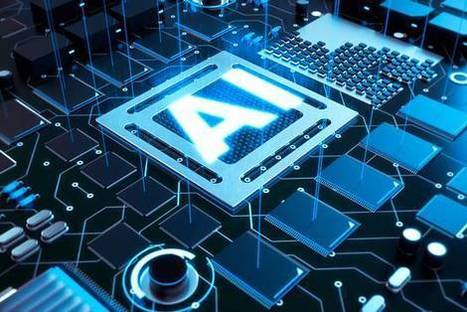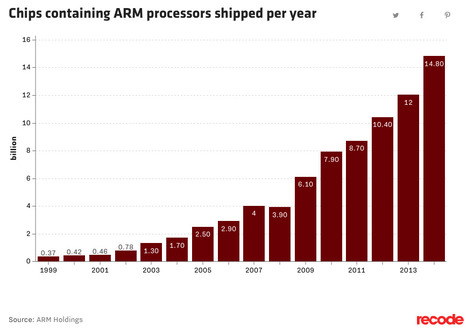For some years now, there has been a tension between the world’s largest tech companies— Alphabet, Amazon.com, Facebook, Apple, Microsoft, Baidu, and Alibaba Group Holding—and the chip companies they rely on, especially Intel and Nvidia.
While the giants buy massive quantities of Intel’s (ticker: INTC) microprocessors, and Nvidia’s (NVDA) graphics chips, or GPUs, to power their data centers, they are also in an arms race to have the best artificial-intelligence-based machine-learning functions. Because of this, there was always the possibility the giants might decide to buy fewer off-the-shelf parts and make their own custom chips to get an edge on one another.
That prospect burst onto the scene again last week as Bloomberg reported that job listings at Facebook (FB), and remarks by unnamed sources, indicate that the social-networking giant is working on making its own chips.
The development, if true, is not surprising. Barron’s wrote 2½ years ago about how AI might push the giants to make their own parts (“Watch Out Intel, Here Comes Facebook,” Oct. 31, 2015). One of the chief sources in that article was none other than Facebook’s guru of machine learning, Yann LeCun.
Facebook declined to make LeCun available, but in that 2015 interview he outlined a dilemma Facebook confronts with machine learning that has probably not changed since then.
Facebook receives hundreds of millions of photographs from its users on a daily basis. Its computers must analyze, within a couple of seconds of a picture being uploaded, whether to show that picture to one of your friends, to block it for questionable content, and to tag the images with your friends’ names, using facial recognition—all examples of machine learning.
As LeCun explained, machine learning is breaking the current generation of chips. The amount of media continues to rise and down the road is more complex media. Imagine a future where people upload 3-D models of places they’ve been from their next-generation smartphones.
“The amount of infrastructure if we use the current type of CPU [central processing unit] is just going to be overwhelming,” he remarked.
LeCun said that Facebook is receptive to Intel or another vendor making its own neural-network processor, but he warned, “If they don’t, then we’ll have to go with an industry partner who will build hardware to specs, or we’ll build our own.”
LeCun and Facebook may have decided now is the time to go it alone. Intel’s plans to have its own AI chip have not yet borne fruit in terms of shipping parts. Nvidia is really the undisputed leader in AI chips. That brings with it a certain anxiety of relying on a single vendor.
Nvidia, moreover, increasingly views its software for programming its chips, called CUDA, as a kind of vast operating system that would span all of the machine learning in the world, an operating system akin to what Microsoft (MSFT) was in the old days of PCs. That sort of preeminence is doubtless disturbing to the giants, who want their AI to have a unique flavor and advantage.
But the main reason for custom chips is that Facebook and the others simply think they can do better. Chips for machine learning rely on algorithms and data, and the giants know both of those more intimately than the chip makers. They have the intellectual property that really matters.
LeCun and other scholars of machine learning know that if you were starting with a blank sheet of paper, an Nvidia GPU would not be the ideal chip to build. Because of the way machine-learning algorithms work, they are bumping up against limitations in the way a GPU is designed. GPUs can actually degrade the machine learning’s neural network, LeCun observed.
“The solution is a different architecture, one more specialized for neural networks,” said LeCun.
All that seemed mere speculation back in 2015, but it may now be a conclusion Facebook and others can’t avoid. Alphabet’s Google has already made its own chip—the TPU, as it’s called—for machine learning. Google and its brethren have the funds to pursue almost limitless experiments to see what they can make.
At the same time, AI chip start-ups such as Silicon Valley’s Cerebras Systems are pursuing radically new chip designs. Although Cerebras is in stealth mode, its work appears to rest on a completely different kind of math than what GPUs use—“sparse matrix” math—which may be better suited to machine learning.
The risks to Nvidia are minimal at present. The company can still sell tons of chips to every company that doesn’t have the deep pockets of Facebook or Google. The reality of machine learning and chip design, however, means a future in which Nvidia’s role is going to diminish. Advanced Micro Devices (AMD) is Nvidia’s closest competitor, and it has an opportunity as the challenger. Intel, Qualcomm (QCOM), and Broadcom (AVGO) also may prove to be contenders, but their ability to compete is probably less than the start-ups building the right designs from scratch.
As for mergers and acquisitions, except for the smallest companies, such as Cerebras, it’s unlikely Facebook wants to buy Nvidia or any large chip maker. They already know that at the end of the day, the most valuable intellectual property in AI is found in the algorithms chugging away in their own data centers.
 Your new post is loading...
Your new post is loading...
 Your new post is loading...
Your new post is loading...


















